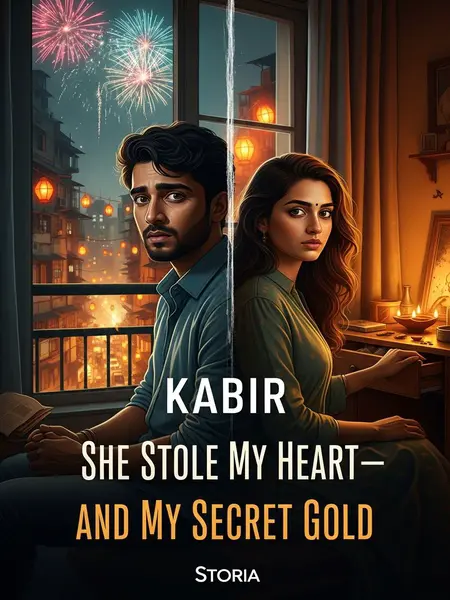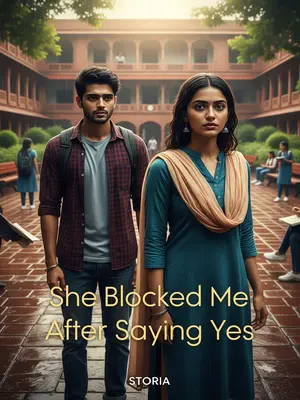Chapter 1: Shadows Before Diwali
I used to work at a real estate company. Right before Diwali, something happened at the construction site—the project was halted, and I got laid off too.
The city was already bursting with Diwali energy. Every balcony glimmered with lanterns and fairy lights, while the distant thump of dhol beats mingled with the sticky sweetness of jalebi on my fingers. Down in the bazaar, aunties haggled fiercely over rangoli powders, and the air was thick with marigold and agarbatti. Diwali always brought that peculiar mix of excitement and anxiety, but this year—with my job gone—it felt heavier than ever.
After I was let go, I couldn’t shake the uneasy feeling that someone was watching me. The weight of my mother’s worried glances during chai time pressed down on me. I’d scroll endlessly through job alerts on Naukri.com, thumb hovering over 'Apply,' but never feeling ready. My mind was restless.
Sometimes, when I was alone in my PG, my own shadow would stretch oddly across the cracked walls, making me jump. Even with the fan clacking overhead and a Bhojpuri remix blaring from the next room, I’d sense someone’s gaze creeping up my neck. It was the kind of feeling that makes you turn around sharply—only to find nothing but the leftover chai cooling on your desk.
Bit by bit, I started to suspect the company wasn’t actually out of money—they must have dug up something they shouldn’t have.
In India, you hear these stories—temples discovered under construction sites, haunted wells, families suddenly cursed. My mind kept circling the idea that we’d disturbed something meant to stay hidden, and now, there’d be consequences.
Our real estate company was a no-name developer, barely a dozen employees. The office looked more like a rented flat than a real HQ—the walls still had faded calendars with half the pages torn out, and the boss’s old Bajaj scooter was always parked right outside the door. A creaky Godrej almirah stood beside a fridge that never worked, and the AC only ran when the boss was around. Most of us drank tea from mismatched glass tumblers, and Bhaskar, the peon, doubled as chaiwala and errand boy.
We handled all sorts of tourism projects, always in the middle of nowhere. If you asked me, only NRIs with wild dreams or politicians with black money would invest in these places. There was always gossip at the chai tapri next door: “Yaar, who buys these houses? Log toh sheher mein bhi nahin rehte properly.”
Honestly, I always wondered who on earth would buy those houses, but I’d heard the boss was filthy rich, and there were never any performance reviews. My mother would say, “Beta, kaam achha hai, bas boss ki buri nazar na lage.” And I, happy with no appraisal stress, stayed quiet and made the most of it.
With the market being so bad these past two years, I just went with the flow. I kept my head down, collected my salary, and didn’t bother asking too many questions. Who wants extra attention when the job market is on fire—literally and figuratively?
This year, all of us were working on a vacation villa project in a mountain valley near Kaveripur—a fifth-tier city. The sort of place where the nearest Domino’s was forty kilometres away, and the local market closed after sunset. Still, people said the air was pure and the stars shone brighter. Kaveripur itself was the kind of small city that’s mostly famous for its railway crossing and for being on the way to somewhere else.
The company was usually super chill, so whenever the higher-ups weren’t around, I’d sneak off to go fishing with Rohan from engineering. We’d sit on the muddy bank, legs dangling, swapping stories about our college days, munching on samosas from a nearby stall. Most days, we didn’t even catch anything, but the peace was worth it. Rohan was my partner in crime, always up for a little masti.
That day, we’d just set up our rods when Rohan’s phone rang—he was told to get back immediately.
The moment he answered, I could tell something was off—he started muttering, “Haan sir, abhi aa raha hoon.” The line was bad, and I could only hear static and a couple of angry words.
I asked what was up, but he had no idea either, just that something had happened at the construction site.
Rohan just shrugged, stuffing his phone in his pocket. “Arrey, chhod na, site pe toh roz kuch na kuch ulta seedha hota hai.”
Stuff at the site could be big or small, so we didn’t dare waste time. We packed up and rushed back.
We left the rods by the water, not even bothering to collect our deposit from the chaiwala. On the way, Rohan drove like a man possessed—horn blaring, nearly running over a stray dog. My heart thudded in my chest, not just from the speed. I fumbled with my phone, almost dropping it as I considered calling my mother to say I’d be late—then thought better of it.
I rode in his car, and before we’d even parked, we saw a bunch of workers crowded around the edge of a huge pit.
From a distance, I saw their yellow helmets bobbing, all peering over the edge as if Shah Rukh Khan himself had arrived. There was a strange energy in the air—half excitement, half tension.
Honestly, it’s embarrassing to admit, but that was the first time I’d actually gone to the site, even after working on the project for so long. My job was marketing, so I always had a reason to stay away from the dust and sun. My office shoes were still shiny, never caked in the red soil like the engineers’.
But it wasn’t totally my fault—our company was laid-back about everything except site safety, which was managed extremely strictly. The site supervisor, Mr. Nair, was a Malayali man with a booming voice. He’d once thrown a fit because someone forgot their helmet. “Safety first, sab samjhe?” he’d thunder. Everyone took him seriously.
They’d put up a massive fence around the whole site, sealing it off tightly. The fence was covered in blue plastic sheets, and every so often, you’d see signs painted in both English and the local language: "Site par pravesh mana hai." I always felt like it was more fortress than construction zone.
Until the project was ready for handover, anyone who wasn’t in engineering had to fill out this long, annoying application just to get in. And those forms? They asked for everything—your blood group, mother’s maiden name, even what you had for breakfast. HR auntie would scold anyone who left a line blank. Nobody wanted to deal with that hassle.
So most of us stayed in our air-conditioned office, far from the dust, sipping chai and minding our business. Gossip spread faster than the actual project updates.
But when I saw the site, I was still shocked. For a second, it looked like a movie set—maybe something out of KGF, only without Yash and his black shades. The pit was massive, the sort you see only in photos of metro rail projects or deep borewells gone wrong.
This was supposed to be a mountain villa project. Normally, you wouldn’t even build a basement—just build from the ground up, saves time and more than halves the cost. Even the local mason would have told you—“Saab, kyon kharcha karte ho? Sidha khada karo na!” It made no sense to dig so deep here.
But what I saw was a gigantic, deep foundation pit, like someone had dug out half the mountain. There were JCBs lined up like soldiers, their buckets caked in red mud, and the pit just swallowed everything around it. If you shouted, your voice would probably echo back from the other side.
If you went by standard floor heights, even if you put a villa in there, the roof wouldn’t even poke out. It was as if the place was meant for giants, not vacationers from Mumbai or Bangalore. The whole scene looked absurd, almost funny if it wasn’t so puzzling.
What the hell, is this an old air-raid shelter or what? Or maybe some old zamindar’s hidden escape route? I even joked, “Kya pata, British time ka kuch hai!” But inside, I felt a strange chill.
Suddenly it all made sense—no wonder all those inexplicably rich people came to buy houses in a place even ghosts wouldn’t want to live. I remembered those sleek Audis and BMWs that would show up for site visits, always at odd hours. Their owners never spoke much, just nodded and left. People in the office would gossip, “Definitely black money, yaar.”
But what I was dying to know was, what exactly happened at the site?
There was too much excitement in the air for a normal workday. I elbowed my way closer, heart thumping. Whatever it was, it had everyone’s attention.
Because judging by the workers’ faces, they all looked excited and happy, crowding closer. It didn’t look like an accident—more like something amazing had happened. You could see some of them smiling, others already calling someone on their phones. A couple of them were even trying to sneak photos, though the supervisor kept shooing them away.
I grabbed a guy and finally got the scoop: they’d dug up gold.
He whispered, “Bhaiya, sone ka dabba mila hai!” His eyes were shining, like he’d seen Ganeshji himself emerge from the ground. One worker, eyes wide with awe, quickly tied a red thread around his wrist for protection, muttering a small prayer as he glanced up at the sky.
Are you serious? Did they unearth some ancient treasure or what?
My head was spinning. I started imagining: What if it’s some Raja’s hidden loot, or gold coins from some old temple? In our country, such stories are everywhere.
I rushed over to join the crowd and check out the scene. I pushed and jostled—ignoring a couple of curses—to get a better look. My shirt stuck to my back, sweat prickling despite the cool mountain air. I could taste the dust every time I swallowed. The pit had a strange glow, and my heart was beating so fast I could hardly breathe.
But just as I squeezed in and caught a glimpse of something shiny on the ground, someone shoved me out.
It was Rohan—he’d rushed in before and looked nervous as hell.
“Arrey yaar, what are you doing crowding around? Get out of here! The company’s security team is on the way, the project manager’s coming, and I heard the boss is heading over too.”
His voice was low, but urgent. He kept glancing over his shoulder, sweat beading on his forehead despite the winter chill. It was obvious he was scared.
I understood right away. The two of us sneaking off to fish was already slacking off, and now he’d brought me straight onto the site.
If security saw us and reported it, even if we didn’t get chewed out, we’d be in deep trouble.
Everyone knew the company’s higher-ups could turn from relaxed to strict in seconds, especially if there was trouble. One word to HR and it was tata-bye-bye.
I flashed him an OK sign and quickly took a shortcut back to the office, pretending I’d never been there. As I slipped it into my pocket, I glanced around—half-expecting someone’s dadi to catch me red-handed and shout, “Chor! Chor!”
I even stopped by the chaiwala on the way, trying to look casual, as if I’d just stepped out for a smoke. My hands were still shaking, though.
For the rest of the day, the company was suddenly buzzing with activity. Phones rang off the hook, people I’d never seen before rushed in and out. Even the usually lazy watchman, Murugan, was alert, his eyes darting around as if expecting a film shoot.
Car after car pulled up downstairs, and the office filled with a bunch of unfamiliar faces. Some looked like they were from the Mumbai head office, others were probably legal types or maybe even people from some government department. I felt like an extra in a crime thriller.
But looking at their badges, they were all company people. Most wore those red lanyards with the company logo. They didn’t smile, didn’t even ask for tea. That’s when you know things are serious in India.
Then we were told to stop all work immediately and go home. There was no explanation, just a stern announcement from HR, her usual friendly tone gone. "Aap log sab ghar chale jaayiye. Kisi ko kuch puchhna nahi hai."
Most people at the company had no idea what was going on—everyone just felt secretly pleased. For most of us, an unexpected half-day is a blessing. I saw people grinning, packing up their bags. The local boys were already planning a round of carrom in the canteen.
I figured it had to do with the construction site, but seeing how tense things were, I kept my mouth shut. In our office, asking too many questions was the fastest way to get blacklisted. My mother’s voice echoed in my head: "Jitna pucho, utna phanso."
That night, I called Rohan several times to ask what happened, but couldn’t get through. He always picked up on the first ring. This time, it was just the endless beeping. My stomach started to twist with worry.
I searched online, but there wasn’t a single piece of news about any archaeological finds. Maybe the company managed to keep it under wraps. I tried Twitter, Facebook, even the local WhatsApp groups—sab chup. In India, news travels faster than light, but here, it was total silence. Only more suspicious.
Early the next morning, as soon as I got to the office, HR called me into the meeting room. She was waiting outside, lips pressed together. Even the engineers looked serious, like school kids about to be punished.
Inside, besides a few senior leaders and some engineers, basically everyone was there. The room smelled of strong filter coffee and nervous sweat. The blinds were half-drawn, and everyone was clutching their notepads, eyes flicking around.
HR handed us a form, asking us to write down what we did yesterday, with exact times and who we were with for every item. The form was long—almost like a police FIR. It asked for details down to the minute. My hands trembled as I filled it in.
I realised right away—they were checking if anyone had gone to the construction site. I tried not to show my panic. After all, I was just the marketing guy, right?
Luckily, I was in marketing, and since the project wasn’t for sale yet, I was the only one in my department. There was no one to contradict me—no colleagues, no assistants. Only my own word.
I made something up, saying I’d gone to town to check on ad placements and then came back to the office. I even added a fake receipt number, just in case. Years of experience in Indian offices had taught me the value of a plausible alibi.
As long as Rohan didn’t rat me out, nobody would know I’d been at the site. My friendship with Rohan was strong, but I still prayed silently, “Bhai, don’t sell me out.”
Sure enough, after collecting the forms, HR came back a while later and didn’t say anything to me. Her expression was unreadable, but I took her silence as a green signal. My heart finally slowed down.
But then she dropped a bombshell. She said there’d been a minor engineering accident at the site yesterday, the project was suspended indefinitely, and since company funds couldn’t be recovered, the company was being dissolved on the spot.
I felt the ground slip beneath my feet. One minute, I was planning next week’s ad campaign, the next, I was jobless. The others around me looked equally shell-shocked.
However, the company was giving everyone N+5 severance pay (that’s the legal minimum plus five months’ salary—a huge payout), but we had to sign a pledge not to disclose anything about the project, or we’d have to pay back triple the compensation.
That was unheard of. In this market, companies were sacking people without a paisa extra. But here, they were throwing money at us—too good to be true. I could see a few people’s eyes light up, but others looked more scared than happy.
And they’d already bought tickets for everyone to return to their hometowns. We were to pack up and be driven to the airport that afternoon. There was no time to argue, no space to negotiate. "Sab ke tickets aa gaye hain, aap log packing shuru karo," HR said, waving a folder of e-tickets. It felt like we were being thrown out before we could even ask, “Why?”
The compensation was generous, but getting fired out of nowhere left everyone shell-shocked. Some people called their families right away, voices shaking. Others just sat down quietly, staring at their hands. It felt like the last day of college—a strange mix of relief and fear.
I was, of course, the most confused. My head was spinning—gold, layoffs, secrecy. I couldn’t make sense of any of it. I just wanted answers, but there was no one to ask.
Rohan still hadn’t contacted me, and the site had clearly dug up gold, not had any accident. A million thoughts raced through my mind—was Rohan okay? Why was everyone acting so scared? Was the company trying to keep everything for themselves?
Knowing the kind of people who run these companies, nothing would surprise me. Log toh kuch bhi kar sakte hain for gold.
Thinking that, I slipped back to my PG room. The ceiling fan clacked overhead, and someone in the next room blasted a Bhojpuri remix on their phone.
I took my hand out of my pocket and opened my palm. Inside was a heavy chunk of gold I’d snatched up during the chaos yesterday. It was cool and dense, its surface pitted and dirty, but unmistakably precious. I stared at it, feeling a strange thrill.
Since the company was so shady, I’d just keep this as a souvenir. Maybe it was wrong, maybe it was stupid, but after everything, I felt I deserved at least this much. After all, India mein toh har koi apna hisaab rakhta hai.
But as I left the office that day, I couldn’t shake the feeling that the real story was just beginning—and that I was already in too deep.












